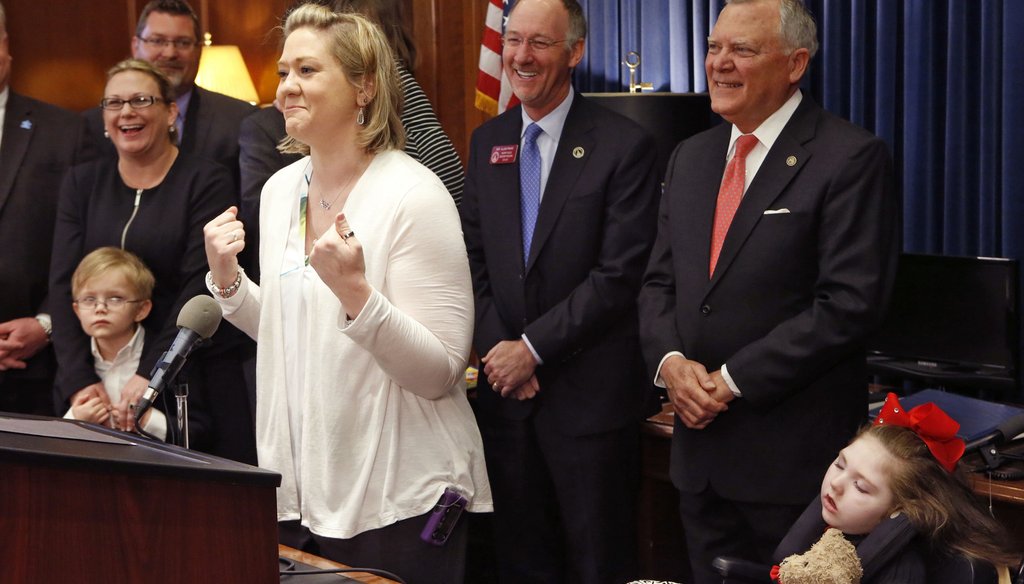Get PolitiFact in your inbox.

Janea Cox expresses support for a deal legalizing the cannabis oil that is expected to help control the seizures suffered by daughter, Haleigh, right. Photo by Bob Andres / AJC
The path to medical marijuana in Georgia is all but paved.
Gov. Nathan Deal has issued an executive order directing state agencies to ready for the legalization of cannabis oil and has said he will sign the legislation on the issue once the legislative session ends this week.
That will open up legal use of the oil to treat seizure disorders as well as cancer, Crohn’s disease, Lou Gehrig’s disease, mitochondrial disease, multiple sclerosis, Parkinson's disease and sickle cell disease.
But the two-year battle to grand access to the marijuana compound was marked with extensive political debate and more than one misunderstanding. PolitiFact Georgia looked at the some of the issues as the proposal wound its way through the process.
EFFECTIVENESS IN CONTROLLING SEIZURES
State Rep. Allen Peake, R-Macon, became the advocate of medical marijuana last year, saying he took the issue on after meeting a 4-year-old girl from his area who suffered from a severe seizure disorder.
He successfully convinced the House to pass a legalization effort last year, in part by arguing that every child who received the treatment in Colorado had seen diminished seizure activity.
The measure later died in the Senate, but not before PolitiFact Georgia looked at the claim.
Peake later cited newer data, saying the rate was 98 percent. We found very few studies available, given the limitations on researching the drug.
The research that has been done showed medical marijuana has a positive impact on seizure activity, but not at the levels Peake said.
We rated his claim Half True.
THE LOWDOWN ON GETTING HIGH
Peake revived the measure this year and, before the session even began, tackled a common misconception of the cannabis oil he was promoting.
Unlike marijuana, he said, the medical compound cannot get you high.
Eleven states --- including neighboring Alabama, Florida, North Carolina, South Carolina and Tennessee --- already have laws allowing cannabis oil products for limited medical uses.
The key difference in allowing the oil, versus the full plant, is that it is high in cannabidiol (CBD, an antioxidant) and low in tetrahydrocannabinol (mind-altering THC).
Even the National Institute on Drug Abuse considers the oil "non-psychoactive," or unable to generate a buzz.
The limited number of existing studies said the same thing. And no anecdotes from parents acknowledge or report any "high" from cannabis oil when treating their children.
We rated Peake's statement True.
OTHER CONCERNS
Part of the conservative pushback on legalizing medical marijuana focused on stricter limits of the drug.
Chuck Spahos, executive director of the Prosecuting Attorneys’ Council of Georgia, warned a joint legislative committee about "drugged driving" problems in Colorado after that state legalized broader uses.
"Colorado has seen a decrease in traffic fatalities by 14.8 percent between 2007 and 2012," Spahos said. "But it’s up 100 percent for operators who tested positive for marijuana."
Prosecutors were not opposed to the cannabis oil but worried about a second bill that would have allowed smokeable and edible forms of the drug.
However, PolitiFact found the report that published those numbers was based on flawed data. Official government statistics could not confirm the numbers, partially because the state did not have a standard for testing.
That cautions against using what figures are available to reach any specific conclusions.
To be sure, impaired driving is a safety risk for any community. Whether broader access to marijuana would increase drugged driving, though, is not clear. For that reason, we rated Spahos’ claim as Half True.
Our Sources
See individual reports.














































